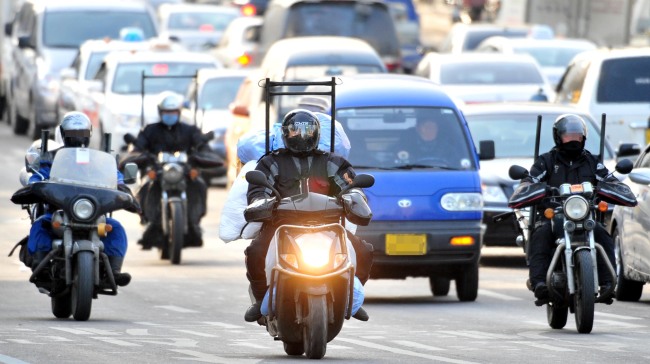On a Saturday morning, a middle-aged man in a black leather jacket cuts between vehicles on a motorbike to reach the head of the queue at a red light. When the light turns green, he whizzes past other vehicles, riding off with a big pile of packages loaded on the back of his bike.
“I like Saturdays. There’s less traffic and I can travel more quickly,” said Koag Sung-soo, a 54-year-old courier.
Koag delivers documents, parcels or just about anything that is not too heavy or big for his 125 cc motorbike in and around Seoul.
He said he picked up rolls of fabric from a factory in Gunja-dong, eastern Seoul, and delivered them to an office across town in Yeouido in less than 35 minutes that morning for his first delivery of the day.
“Saturdays aren’t busy, there aren’t many calls. But during the week I make at least 10-15 stops a day,” Koag told The Korea Herald.
It is estimated that there are currently more than 170,000 couriers like Koag working across the country, especially in major cities. Their work is called “quick service” here because they offer the fastest and also the cheapest two-wheel delivery service. They wear an outfit that proves it: black leather jackets, thick black gloves, knee pads and masks.
The first quick service started in Korea in the early 1990s for delivering documents between offices. And the country’s “palli-palli” ― or “hurry-hurry” ― culture has helped make it a unique, flourishing industry over the past decades, improving the level of convenience in Korea.
The point-to-point instant delivery service is currently available across the country. Their rates are calculated on the basis of distance and weight, starting with average of 7,000 won ($6.60) for up to 5 kilometers and between 8,000 won and 15,000 won for up to 10 kilometers.
Even in the Internet age, when most online content is available in seconds, people still need to deliver things that cannot be transferred by digital means, such as flowers, gifts and original signed documents, according to veteran motorbike messenger Kim Young-dae.
Even people who are in a rush to get to important tests or job interviews use the quick service, he added. “I often get calls from people who want me to ‘deliver’ them. We charge extra fees, though, because it’s more difficult and dangerous to deliver people.”
Kim, 57, who has worked for 20 years in the delivery business, said the service has also gone high-tech and become more convenient for both messengers and customers.
“We used to carry big walkie-talkies and GPS devices. Now we’re able to receive orders, scan packages and collect signatures all with smartphones,” he said.
“Smartphones have made our service more convenient.”
Kim, however, admitted he dislikes delivering items in the summer when he has to battle the “scorching sun, boiling-hot asphalt and unpleasant traffic fumes.”
Winter is not his favorite time of year, either, as he has to deal with icy roads and bone-chilling winds.
Kim said that wages and working conditions have hardly changed over the years.
“The delivery prices have little connection to reality. Despite rising fuel and living costs, it has remained the same for so long,” he said, noting that the excessive number of quick-service messengers is forcing down prices and eating away at margins.
Two years ago, Kim and four other colleagues set up a union of motorbike messengers to protect their rights and secure better working conditions.
“One of our major concerns is that there is no legislation that protects us,” he said.
According to Kim, many bike messengers work illegally because the current law still restricts motorcyclists from carrying freight on their vehicles.
“Without regulations, the quick service market will be flooded with unregulated firms and couriers. The law will soon be revised so that we can work more fairly and safely,” Kim said.
Until then, quick-service couriers like Koag will have to speed dangerously between cars, racing to make more delivery stops.
“I know it’s dangerous, but we have to rush to get more deliveries done. We need to make at least 10 stops a day to make a living,” he said.
By Oh Kyu-wook (
596story@heraldcorp.com)





![[Exclusive] Hyundai Mobis eyes closer ties with BYD](http://res.heraldm.com/phpwas/restmb_idxmake.php?idx=644&simg=/content/image/2024/11/25/20241125050044_0.jpg)
![[Herald Review] 'Gangnam B-Side' combines social realism with masterful suspense, performance](http://res.heraldm.com/phpwas/restmb_idxmake.php?idx=644&simg=/content/image/2024/11/25/20241125050072_0.jpg)

